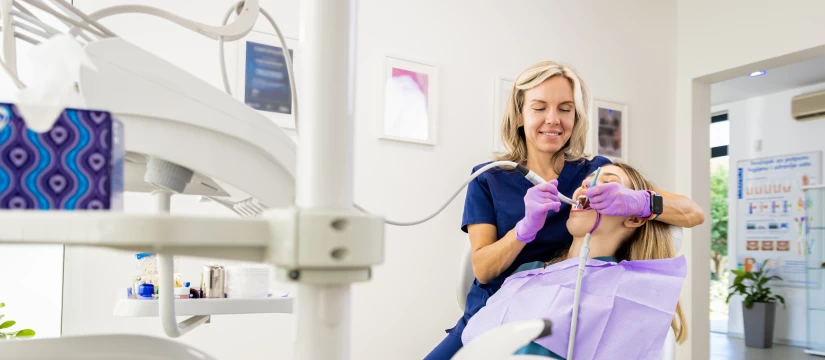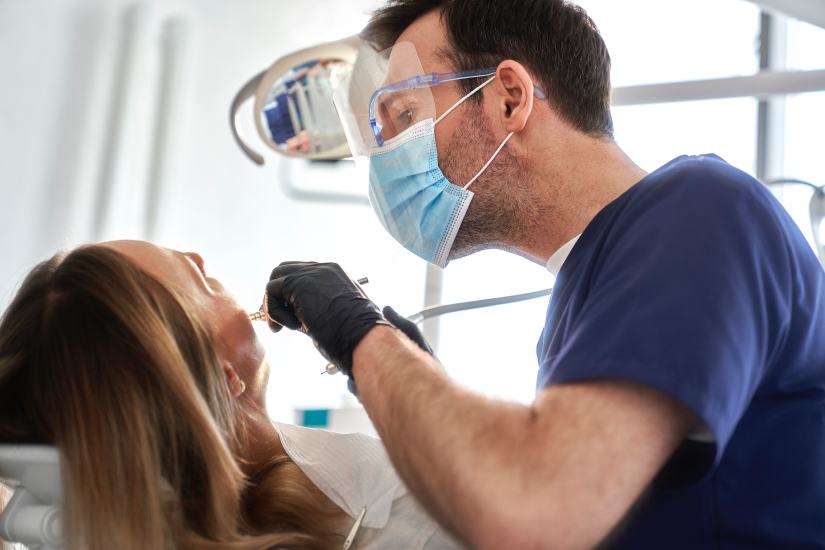Laser teeth whitening has rapidly gained popularity as an advanced cosmetic dental procedure designed to brighten and enhance the appearance of the smile. Known for its quick results and effectiveness, laser whitening is commonly offered in dental clinics across Turkey. However, like any dental procedure, it is essential to assess the safety of the treatment. This article delves into the safety of laser teeth whitening in Turkey, discussing its benefits, potential risks, and the safety protocols followed by clinics to ensure that patients receive the best and safest possible care.
Understanding Laser Teeth Whitening
Laser teeth whitening involves the use of a laser light to activate a special whitening gel applied to the teeth. The process is designed to accelerate the chemical reaction of the whitening agents, typically hydrogen peroxide or carbamide peroxide, which break down stains and discolorations on the enamel.
The use of lasers in teeth whitening is intended to achieve faster and more dramatic results compared to traditional whitening methods. Typically, the procedure is completed in one visit, with patients often seeing a significant improvement in the color of their teeth by several shades.
Regulatory Oversight and Standards for Laser Teeth Whitening in Turkey
In Turkey, all dental procedures, including laser teeth whitening, are regulated by the Turkish Dental Association (TDB) and the Ministry of Health (MoH). These bodies establish guidelines and regulations to ensure patient safety during treatments, including the use of laser technology in dental procedures.
Laser devices used in Turkish dental clinics must comply with international safety standards, including certifications such as CE or FDA approval. These certifications ensure that the devices meet established safety, quality, and performance standards before they can be used in clinical settings. The Turkish Ministry of Health also provides regular oversight to ensure that dental clinics use only authorized and safe devices for procedures like laser teeth whitening.
Furthermore, dentists and dental professionals who perform laser teeth whitening are required to have specialized training. In Turkey, dental professionals must undergo training to operate laser technology safely and effectively. This training ensures that the laser is used correctly, minimizing the risks to patients.
The Safety Protocols for Laser Teeth Whitening in Turkish Clinics
When performed by trained professionals using approved equipment, laser teeth whitening is generally considered safe. However, like any medical procedure, there are precautions and protocols that must be followed to ensure patient safety and minimize risks. Below are the key safety protocols that Turkish dental clinics follow:
-
Pre-treatment Assessment
Before undergoing laser teeth whitening, patients must undergo a thorough pre-treatment assessment. This includes a complete oral examination to ensure that the teeth and gums are healthy enough for whitening. Patients with untreated cavities, gum disease, or enamel erosion may be advised to address these issues before proceeding with whitening. A dentist will also assess the patient’s tooth sensitivity and medical history to determine if laser whitening is appropriate for them.
-
Informed Consent
Informed consent is a critical part of the laser teeth whitening procedure. Dental clinics in Turkey ensure that patients are fully informed about the treatment process, potential risks, and any side effects. Before undergoing the procedure, patients must sign an informed consent form acknowledging their understanding and acceptance of the treatment.
This transparency ensures that patients are not only aware of the benefits but also the potential risks, such as temporary tooth sensitivity, gum irritation, or uneven whitening results. By signing the consent form, patients confirm that they are comfortable with the procedure and that they understand the care involved.
-
Use of Safe and Approved Whitening Agents
In Turkish dental clinics, only FDA-approved or CE-marked whitening gels are used during laser teeth whitening. These products contain safe concentrations of hydrogen peroxide or carbamide peroxide, which are designed to effectively whiten teeth without causing harm. The combination of laser light and the whitening agent works by breaking down the stains on the enamel and lifting discoloration, but it must be done in a controlled manner to avoid damage to the teeth.
The active ingredient concentrations are carefully monitored to ensure that they remain within safe limits, as excessive concentrations could lead to irritation or damage to both the teeth and gums. The whitening agents used in Turkey’s clinics are also stored and handled according to safety standards to ensure their effectiveness and safety.
-
Protective Measures for Gums and Soft Tissues
One of the most important safety protocols in laser teeth whitening is the protection of the gums and surrounding soft tissues. During the procedure, a rubber dam or a special gel is used to shield the gums from the laser light and whitening agent. This prevents irritation or burns that could occur if the sensitive tissues in the mouth are exposed to the laser or chemical agents.
Proper isolation of the gums ensures that the whitening agent is applied only to the teeth, where it can work most effectively, without causing any harm to the soft tissues.
-
Monitoring of Laser Intensity and Duration
The laser device used in teeth whitening must be carefully calibrated to ensure that the intensity and duration of the light exposure are within safe limits. Overexposure to laser light can potentially lead to tooth sensitivity or discomfort. In Turkish dental clinics, experienced professionals monitor the laser treatment closely to adjust the settings as necessary, ensuring that the process is both effective and safe.
The treatment duration is also closely controlled to avoid excessive exposure, which could cause adverse effects on the enamel or surrounding tissues.
Risks and Side Effects of Laser Teeth Whitening
While laser teeth whitening is generally safe when performed correctly, there are some potential risks and side effects that patients should be aware of. These include:
-
Tooth Sensitivity
One of the most common side effects of laser teeth whitening is increased tooth sensitivity. This is typically temporary and resolves within a few days after treatment. The increased sensitivity is caused by the whitening agents penetrating the enamel and affecting the nerve endings in the teeth. -
Gum Irritation
Although the gums are protected during the procedure, some patients may experience mild irritation or discomfort in the gums, especially if the whitening agent comes into contact with the soft tissues. This can be alleviated with proper care and monitoring during the procedure. -
Uneven Whitening
In some cases, the results of laser whitening may not be uniform, with some areas of the teeth appearing lighter than others. This can happen if the whitening gel is not applied evenly or if the laser light is not used properly. -
Enamel Damage
Though rare, excessive use of whitening treatments or improper application of whitening agents can lead to enamel damage, resulting in weakened teeth. To avoid this, it is crucial that patients seek treatment only from qualified and experienced dental professionals who follow established safety protocols.
 Clinic Booking
Clinic Booking



 No Record
No Record